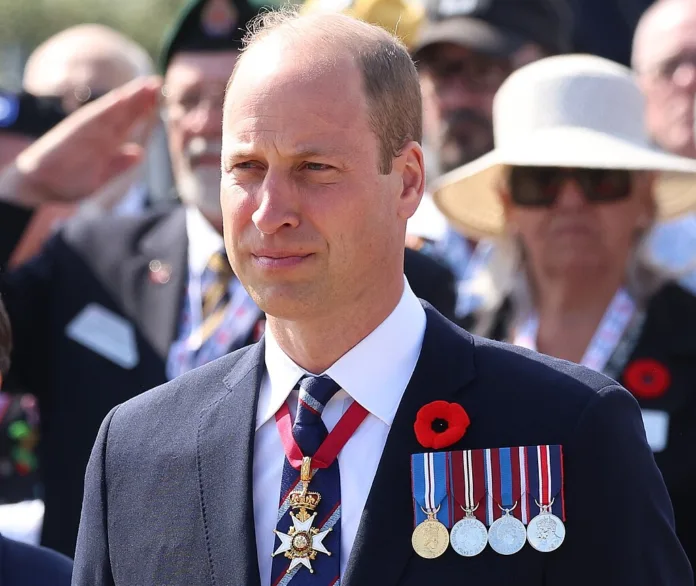Prince William takes over royal duties at the sovereign’s parade after King Charles reveals health issues prevent him from travelling to New Zealand
Prince William has stepped into the spotlight for King Charles, fulfilling royal duties that the King, due to health concerns, could not undertake. As Prince William replaces King Charles in these roles, he demonstrated his new responsibilities by attending the Sovereign’s Parade at the Royal Air Force College in Cranwell on September 12, 2024. This appearance was part of his effort to represent his father, who has been advised by doctors to limit his engagements.
King Charles, who resumed royal duties in April following a brief hiatus due to a cancer diagnosis, has faced new health setbacks. During a recent meeting at Buckingham Palace with the New Zealand women’s rugby team, the King disclosed that he would not be able to visit New Zealand as planned in October due to “doctor’s orders.” This announcement came as the King continues treatment for an undisclosed form of cancer.
In the King’s absence, Prince William took centre stage at the Sovereign’s Parade, which marked the graduation of 48 Royal Air Force Cadets and 4 International Officer Cadets from Jordan, Kenya, Pakistan, and Uganda. The ceremony, held at the Royal Air Force College in Cranwell, is a significant event for the RAF, showcasing the culmination of rigorous training undertaken by the cadets.
Embed from Getty ImagesThe Prince of Wales was honoured with a Royal Salute and observed a flypast over the college. His duties included inspecting the front rank of the Guard, presenting four awards, and delivering a speech congratulating the graduates. Following the parade, Prince William joined the new officers, their families, and friends in the College Dining Room, engaging with them about their experiences and future aspirations.
King Charles’s recent remarks about his health revealed his ongoing struggle and deepened public sympathy. His regret about missing the New Zealand leg of his tour was accompanied by a heartfelt message to the country, expressing hope for future opportunities to visit. The King’s comments also reflected his affection for New Zealand, noting the positive reception of Kiwis in his travels. Meanwhile, Prince William replaces King Charles in official duties, stepping in to uphold the royal commitments and support the engagements his father must forgo.
The royal tour, now adjusted to focus on Australia and Samoa from October 18 to 26, will proceed as planned. This adjustment underscores the challenges faced by the monarchy as King Charles balances his health with his public responsibilities.
Prince William’s engagement at the Sovereign’s Parade demonstrates his increasing role in supporting the monarchy during his father’s health challenges, ensuring that royal duties continue seamlessly despite the King’s limitations.
Analysis
Political: The King’s health issues and Prince William’s increasing responsibilities highlight the shifting dynamics within the British monarchy. As King Charles steps back from certain duties, Prince William’s prominent role signifies a strategic shift to ensure continuity in royal engagements. This transition also underscores the importance of preparing the next generation of royals to handle key responsibilities, reflecting a broader effort to maintain stability and public confidence in the monarchy during times of personal challenge for the King.
Social: King Charles’s candid update about his health provides a rare glimpse into the personal struggles of public figures, resonating with the public’s empathy. His expression of regret about missing his New Zealand visit humanizes the monarchy, fostering a deeper connection with the public. This transparency is part of a larger trend where royals are becoming more open about personal issues, potentially enhancing their relatability and public support.
Racial: The presence of international cadets at the Sovereign’s Parade and the King’s outreach to diverse nations reflect the multicultural engagement of the British monarchy. By acknowledging the contributions of cadets from countries like Jordan, Kenya, Pakistan, and Uganda, the monarchy demonstrates its global inclusivity and support for international relationships. This aligns with broader diplomatic efforts to strengthen ties with diverse nations. As Prince William replaces King Charles in these ceremonial roles, his participation underscores the ongoing commitment of the royal family to fostering international connections and celebrating diversity.
Gender: Prince William’s role in stepping up for King Charles emphasizes the evolving gender dynamics within the royal family. As male members of the monarchy take on more visible roles, there is a parallel discussion about gender balance and representation within the institution. The increasing prominence of male royals in fulfilling royal duties may influence perceptions of gender roles in royal responsibilities and public life.
Economic: The King’s health situation and the subsequent adjustments to the royal tour could impact tourism and related economic activities. Royal tours are significant events that boost local economies through increased tourism and media attention. The change in the tour’s schedule may affect planned engagements and the economic benefits associated with royal visits. However, Prince William’s active role in maintaining public engagements helps mitigate potential negative impacts on the monarchy’s economic contributions.
